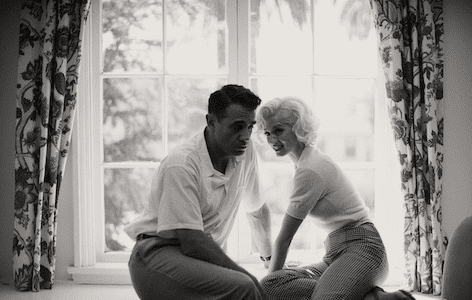 Blonde from Director Andrew Dominik (The Assassination of Jesse James by the Coward Robert Ford) takes the well-known, sad story of Marilyn Monroe, from her tragic childhood to her tabloid fodder death, and beats the drum of the her abuse for almost three hours. They would be thoroughly excruciating hours if not for the stellar performance of Ana de Armas (Knives Out, Blade Runner 2049) in the title role. The film isn’t exactly a biopic since it’s based on a 750-page Joyce Carol Oates novel, and it is hard at times to tell where the line between fact and fiction lies. But I suspect those fictions are many of the scenes that felt off. After all, most of Marilyn’s story has been covered over and over to feed the endless fascination with the screen icon. So this “new” information just doesn’t quite fit.
Blonde from Director Andrew Dominik (The Assassination of Jesse James by the Coward Robert Ford) takes the well-known, sad story of Marilyn Monroe, from her tragic childhood to her tabloid fodder death, and beats the drum of the her abuse for almost three hours. They would be thoroughly excruciating hours if not for the stellar performance of Ana de Armas (Knives Out, Blade Runner 2049) in the title role. The film isn’t exactly a biopic since it’s based on a 750-page Joyce Carol Oates novel, and it is hard at times to tell where the line between fact and fiction lies. But I suspect those fictions are many of the scenes that felt off. After all, most of Marilyn’s story has been covered over and over to feed the endless fascination with the screen icon. So this “new” information just doesn’t quite fit.
The film begins with poor little Norma Jean and her mother. Mom’s not mentally stable and after trying to drown her, she dumps Norma Jean at an orphanage and heads to a mental asylum. On the wall in their house before they leave, Mom points to a photo of a man and tells her that it is her father, a motif that will come up throughout the film as Marilyn searches for her missing Daddy in all the wrong places. The film then skips ahead to her first audition in Hollywood where she is raped by a studio head. And from then on, it’s a series of abuses and tragedies that eventually send her to pills and the bottle and her famous death.
I’m not really sure what the director was trying to do with this film. It certainly is not a portrait of Marilyn but a litany of her worst moments. There is no happy Marilyn. No friends. No connection between her and the men she married, DiMaggio and Miller, or the men she had affairs with. The cruel scene with JFK is entirely about her humiliation. And there are strange shots thrown in of babies floating around in her womb when she is pregnant several times, even a baby POV shot through the speculum when she has a studio forced abortion. Though there are some gorgeous glittery Hollywood shots and a few nicely done recreations from some of Marilyn’s films thrown in, it doesn’t make up for a scattershot script, which ends up feeling like just the latest exploitation of the blonde bombshell. Armas will deservedly be lauded for her portrayal, but sadly the film falls flat.
So skip the flick and watch a few of her films (I suggest Gentlemen Prefer Blondes or Some Like It Hot) or read one of the many good biographies written about her.
Blonde is open now in limited release and begins streaming on Netflix September 28th.

